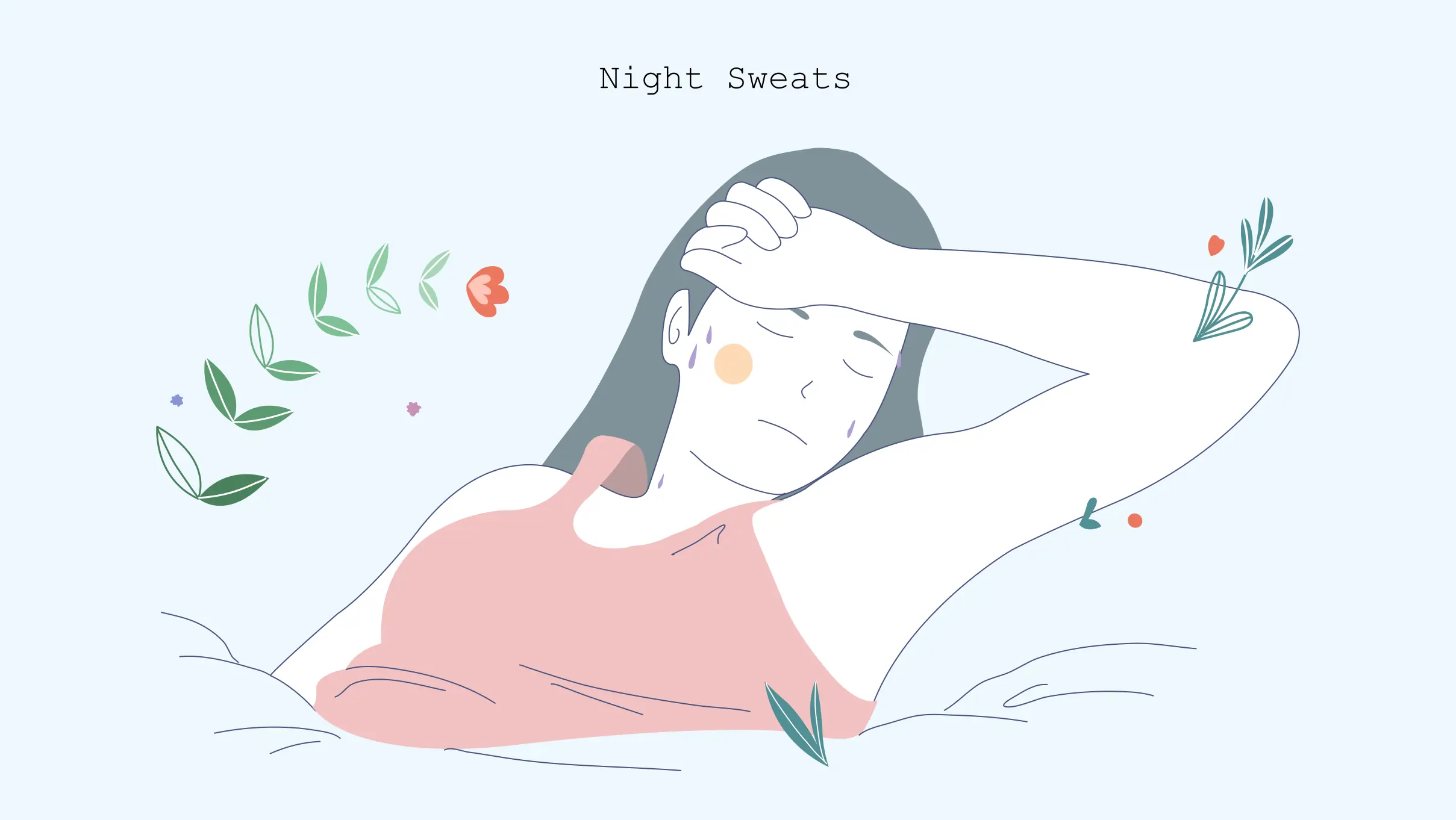Night Sweats: Causes, Treatments & Prevention
Written by


Night sweats is another term for excessive sweating or perspiration occurring while sleeping. It can be uncomfortable and a symptom of an illness or an underlying condition. In this article, we are here to tell you everything you must know about night sweats. Right from causes to prevention methods, read all about it right here!
What Are Night Sweats?
Sweating excessively at night is known as night sweats. It is more than normal perspiration, where your clothes and sheets can get drenched. Night sweats are associated with depression and can also decrease sleep quality.
Night sweats are the most common symptoms of menopause but can also indicate an underlying medical condition. While usually, it is not a severe condition, you must still get it checked if the severity goes up.
What Causes Night Sweats?
Some of the leading causes of night sweats are;
Antidepressants
Antidepressants can lead to excessive perspiration because they have tricyclics and serotonin reuptake inhibitors known to cause sweating. Therefore, if you are experiencing severe sweating while sleeping, you can speak with your doctor to change your medication.
Anxiety
If you are highly anxious or stressed before you hit the sheets, a sense of dread in that particular scenario plays out in your mind, and the overactive brain takes it a notch higher once you fall asleep. And this can be one of the reasons for night sweats in men and women.
Menopause
Night sweats and hot flashes are a symptom of menopause. This occurs because of the changing hormonal levels and also affects temperature regulation. Especially if you are obese, it may aggravate the condition. Therefore, it becomes essential to manage your weight.
Low Blood Sugar
When your blood sugar levels drop, it produces excess adrenaline causing excessive sweating at night. It usually occurs in patients who are taking medicines known as sulfonylureas to combat diabetes.
Alcohol Use
Alcohol affects almost every part of the body, which leads to waking up sweating at night. Also, going through alcohol withdrawal symptoms can be a trigger, which begins just a few hours after you have had your last drink. Some of the other withdrawal symptoms include fatigue, headaches, and nausea.
Underlying Infections
One of the reasons for night sweats can be infections, such as tuberculosis. That being said, bacterial infections can also be why night sweats occur.
Hyperhidrosis
It is a condition where you tend to sweat excessively, so much so that people around you start to take notice. Therefore, if you have hyperhidrosis, it may also cause night sweats.
Sleep Apnea
Sleep apnea is a condition where you tend to start and stop breathing when you are sleeping. When this condition is left untreated, it can have serious consequences. In one study, it was seen that women who experienced heavy night sweats were at risk of developing sleep apnea.
Cancer
If night sweats are unexplained, cancer could also be the reason for excessive sweating at night. However, if that’s the case, you may also notice other symptoms like feeling extremely tired and being unwell often. Therefore, it is best to speak with your doctor. And it becomes all the more critical if you have lost substantial weight recently and your fever doesn’t seem to subside. It can be an early sign of cancer. Night sweats are usually linked to;
- Hodgkin’s lymphoma
- non-Hodgkin’s lymphoma
- Leukaemia
Other symptoms of cancer can also include chills, swollen lymph nodes, chest and stomach pain, and bone pain.
Other Causes
Some of the other causes of night sweats are;
Neurological Disorders: Night sweats can be a symptom of neurological issues, such as;
- Stroke
- Autonomic neuropathy
- Syringomyelia
- Autonomic dysreflexia
Gastroesophageal reflux disease: Also known as GERD, it is an acid reflux disorder. One of its symptoms can be night sweats.
Hormonal disorders: Apart from menopause, other hormonal issues, such as low testosterone, carcinoid syndrome, and even hyperthyroidism, can lead to night sweats.
Autoimmune disorders: Ailments like rheumatoid arthritis could lead to night sweats.
Medications: Apart from antidepressants, other medications can contribute to night sweats. They include;
- Hormonal medicines
- Diabetes medicines
- Medicines used to treat fever or flu
- Steroids
Sometimes, the cause of night sweats remains unknown. However, you can speak with your doctor about the right action.
Symptoms of Night Sweats
While sweating profusely at night is the main symptom of night sweats, some other signs include;
- Waking up drenched
- Heat spreads throughout the body
- Red skin
- Rapid heart rate
Are Night Sweats And Hot Flashes Different?
Yes, night sweats and hot flashes are different. A hot flash is a sudden feeling of warmth in the upper body, mainly over the face, chest, and neck. It can also redden the skin just like you are blushing, sometimes leading to sweating. It can occur anytime in the day and can last for about five minutes. However, night sweats are when you perspire excessively while you are asleep.
How Are Night Sweats Treated?
For night sweats, your doctor may suggest a few treatment plans. They include;
CBT: Cognitive behavioural therapy is a non-medical approach that’s used to treat night sweats if it is due to menopause. In fact, CBT can be combined with other treatments to enhance its effectiveness.
Medications: Your doctor may prescribe medication for hot flashes and night sweats if it becomes too severe. And some medicines include paroxetine and gabapentin. Along with this, your doctor can also ask you to modify your lifestyle, such as reducing your caffeine intake.
How to Prevent Night Sweats
Take a look at the best home remedies for night sweats.
Create A Cool Environment
One of the easiest ways how to stop night sweats is to lower your room temperature. Usually, the best temperature to sleep is said to be between 60 to 67 degrees Fahrenheit. So, keep it at 60 degrees to see if it works for you. Along with that, make sure you don’t use heavy blankets. That will only increase sweating around the neck and chest at night. Also, wear light and breezy clothes and breathable sheets.
Bring Home A Cooling Mattress
Today, several mattresses come with cooling technology to prevent you from feeling too hot at night. In fact, you also get cooling mattress pads in market these days.
Relaxation Techniques
You can try breathing exercises If you are dealing with hot flashes and night sweats. Breathing exercises are known to promote relaxation and reduce any neurochemicals present. And this helps because neurochemicals are responsible for increasing your body’s core temperature. For breathing exercise;
- Position your tongue at the roof of your mouth
- Purse your lips together and breathe deeply through your nose
- Now, inhale and exhale deeply
- As you inhale, count to 4 and then hold your breath at the bottom of your exhale till you count to 6
You can also try this technique to prevent night sweats while pregnant.
Add Natural Foods or Supplements To Your Meals
Adding natural foods or supplements can be a long-term solution to eliminate night sweats or hot flashes. While the research results are mixed, some women have found relief. However, speaking with your doctor is essential to ensure you don’t experience any side effects or interactions with your medicines.
- Eat soy every day. You can try about 1-2 servings. It can decrease hot flashes.
- It is believed that consuming black cohosh supplements can help deal with night sweats. However, it is important to speak with your doctor as it can have a few side effects.
Cut Down Alcohol, Coffee And Spicy Food From Your Diet
Some common triggers that lead to night sweats and increase your heart rate are alcohol, caffeine, and spicy food. Therefore, eliminate them from your diet, at least in the evening. Alcohol, especially, can stay in your system for quite some time and affect every body part. This can increase your perspiration.
Try Drinking Green Tea
A glass of hot green tea before bed can do the trick if you think you have been excessively sweating due to stress. This is because green tea is rich in magnesium and vitamin B, which help constrict your sweat glands. You can also swap your morning coffee with green tea for long-term benefits.
Change Your Medication
If you have been having night sweats after starting a new medication, it might be the culprit. In such cases, speak with your doctor about the side-effect you are experiencing and ask for a change.
When to See a Doctor?
When to be concerned about night sweats? Generally, night sweats are not a cause for worry. That being said, it can be a symptom of an underlying medical condition. If night sweats are due to menopause, they may start around the age of 50. Also, if you have suddenly developed night sweats or if they are too severe, it is essential to speak with your doctor.
Conclusion
Night sweats can be extremely uncomfortable and even disturb your sleep. Therefore, you can use the above-mentioned techniques to help combat the same. However, if nothing works for you, ensure you speak with your doctor.
FAQs
Are night sweats a sign of covid?
Yes, night sweats are a symptom of COVID-19. Even if your other symptoms are mild and you have been sweating excessively, it is a good idea to get tested immediately.
How long do night sweats last?
If night sweats are due to menopause, they can last anywhere between six to 24 months.
Can stress cause night sweats?
Yes, stress can be one of the reasons for night sweats. If you have been experiencing night sweats due to stress or anxiety, you may also notice;
- Constantly feeling worried
- Having other sleep issues, such as unpleasant dreams
- Stomach troubles or digestive problems
- Unexplained pains and aches
- Mood swings or irritability
- Feeling weak or tired
If you have had these symptoms with night sweats, you must speak with your doctor to combat this issue.
Can dehydration cause night sweats?
Yes, dehydration can cause night sweats.
people like this article
Written by








